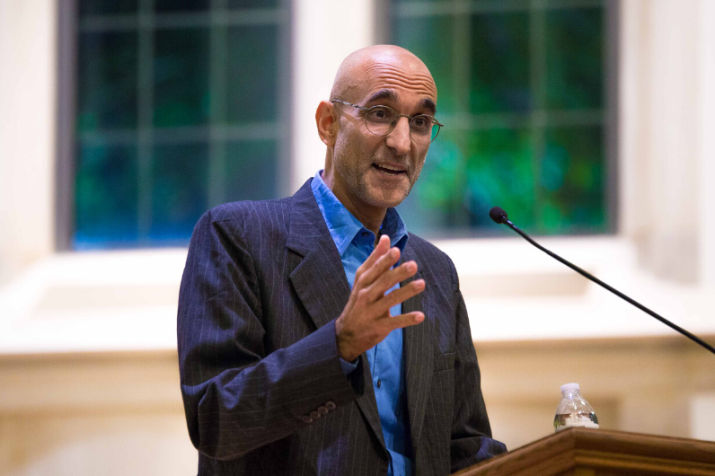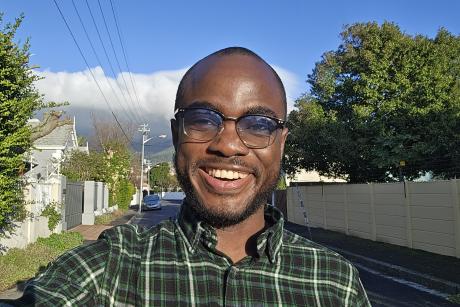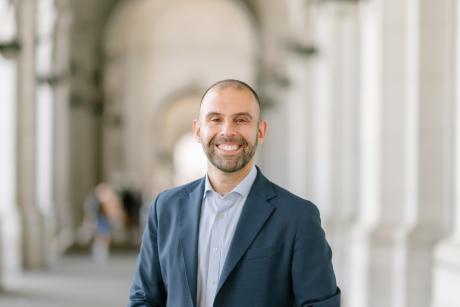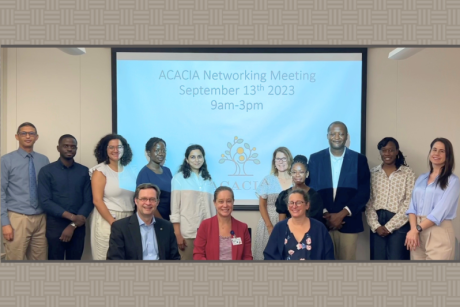
Dr. Tom Catena, speaking at Duke on a recent visit. (Photo courtesy of Duke Divinity School)
Published December 12, 2019, last updated on December 23, 2020
As a kid growing up in upstate New York, Tom Catena MD’92 played sports and went to church on Sundays with his big Catholic family. And when he got sick, he did what everyone in town did: He went to see his Great Uncle Feori.
Feori, his grandmother’s brother, was an immigrant from Sicily who became the town’s highly regarded community physician. Catena says watching his great uncle probably had something to do with his own decision to become a doctor.
Now, just like his Great Uncle Feori, Catena has a whole community turning to him for medical care, although it’s about as far removed from upstate New York as you can get. For almost 12 years, he has been the medical director at Mother of Mercy Hospital in the Nuba Mountains in Sudan, a remote and conflict-torn area in one of the least developed countries in Africa. He is the only doctor in a region with a population of more than 750,000, a status that has earned him wide acclaim and respect as one of the frontline champions of global health.
In November, on one of his infrequent trips back to the United States, Catena returned to Duke—his first visit in 27 years—to deliver a lecture at the Duke Divinity School. Although Catena’s days on campus predate the birth of the Duke Global Health Institute, he has connections with DGHI faculty, including David Toole, associate professor of the practice of theology, ethics, and global health, who visited Mother of Mercy Hospital in 2017 as part of research for a book on mission hospitals in Africa’s Nile River Basin. Catena also stands alongside Paul Farmer and Melinda Gates as Duke alumni who have made seminal contributions to global health.
Catena sat down with DGHI one morning during his visit to share more about his life and global health journey.
The path to Nuba
During college at Brown University, where he played football, majored in engineering and was introduced to evangelical Christianity, Catena’s notions about his future jelled. He had been attending a family funeral back home in New York when he says, “The idea [to apply to medical school] literally just popped into my head. I went to talk to my Uncle Feori. He was in his 70s by then and he was still working all the time.”
After college, Catena declined an engineering job at GE and told his parents he was pursuing medical school. He then headed to Japan for a year to teach English and prepare for the MCAT, the standardized test required to apply to medical school.
“That was a fantastic year. Fun and interesting. I always had a sense of wanderlust. You get that growing up in a small town. I had this insatiable curiosity about how other people lived, what they ate, the architecture, what their daily lives looked like,” he says.
The path to Sudan took years and extensive training. It began when Catena entered Duke Medical School in 1988 and spent one of his summers as a medical student doing a clinical rotation in a rural area of Kenya, a venture funded by a Duke scholarship. He was inspired by his medical mentor there and enjoyed working in a remote community.
While he felt eager to return to Africa after medical school, he had an obligation to the U.S. Navy, which had funded his schooling. At a naval hospital in San Diego he focused on internal medicine and infectious disease, but knew he needed to expand his knowledge and hands-on experience if he planned to become a doctor in a remote setting.
“I thought if I do ever go into mission work, I have to prepare myself. You can’t just do internal medicine,” he says.
With that in mind, he next pursued a six-month flight surgery training course in Pensacola, Fla., followed by stints around the globe—on an island in the Pacific, and in Australia, Japan, Korea, and Thailand—as a flight surgeon. When his commitment to the military ended, he honed his skills further in a family practice residency in Terre Haute, Ind., learning about everything from pediatrics to obstetrics.
Catena then returned to the countryside in Kenya, where he worked for more than seven years. About two years into his time there, he met some medical colleagues who had worked in the Nuba Mountains. “They said, ‘If you think Kenya is difficult, you should see Sudan.’ And I thought, ‘Man, that’s a place I could really sink my teeth into,’” Catena says.
But to face such a challenge, he knew he needed to learn more surgery. “I wanted to prepare myself so you could drop me anywhere and I could do anything—most operations,” he explains.
Growing a medical practice in rural Sudan
In 2008, after five more years of surgical training in Kenya, and following extensive negotiations and permissions from the local bishop, Catena was able to travel to Sudan. He immediately began setting up a practice. “We initially wanted to build an 80-bed hospital. We started with eight expats and 15 local staff,” he explains. Today, he oversees a 435-bed hospital with an annual budget of $800,000 (100 percent funded by donations). They perform close to 2,000 surgeries (major and minor) and log 130,000 patient visits annually.
It has been no simple feat. At the start, it was uncommon for anyone in the region to have been educated beyond the eighth grade, says Catena, who began to teach staff even the most straightforward health skills, starting with how to take a patient’s temperature and graph it. Also, the hospital’s remote location in the isolated Nuba Mountains made it difficult to get supplies.
“There’s no easy way to get there,” says Toole. It took Toole nine days and included hitching a ride on a cargo plane wedged between boxes of medical supplies, traveling for an entire day without roads in a Toyota Land Cruiser, and enduring scrutiny from police in South Sudan and from rebel security forces in the Nuba Mountains.
When Toole finally arrived, he saw that Catena was fully embraced by his community.
“One of the things that I find so fascinating and inspiring about Tom is his level of commitment. He came in as an outsider in 2008. As he describes himself, he is a member of the ‘1 percent,’ given that he has degrees from Duke and Brown. But he made a commitment not to abandon the people. So often the problem in global health is that we come in sincerely wanting to help but we eventually leave. In so many ways, Tom’s like the rest of us. But he stayed,” says Toole
Catena stayed despite years of active conflict in the region, as Sudan’s former president Omar al-Bashir rained bombs on villages in the Nuba Mountains in an effort to maintain authority with the use of fear. Catena, to his great sadness, became skilled at removing bullets and shrapnel—basically running a MASH unit—and, though he helped many heal and survive, he has watched many die, including children.
When humanitarian groups began pulling their physicians, nurses and other healthcare personnel from the region, Catena refused to go. He jokes now that he told his sponsoring agents he was a volunteer and they couldn’t kick him out. But at the time, he was dead serious. “They were telling me my life was more important than the lives of the people there, and that’s not right,” he says.
A cease fire that has lasted since spring 2018 has fueled optimism that the worst fighting is over. And Toole says Catena’s decision to stick with the people of the Nuba helped him win trust in a community that has reason to be fearful of outside influence.
“He’s a western doctor, and of course the people of Nuba have their own traditions about how you heal. They had no reason automatically to trust other methods, which put a lot of pressure on Tom. He knew that if he made a significant mistake, it might forever affect his reputation,” says Toole.
A sea change in the community’s trust in Catena took place about three years into his time there, in the midst of the war, which began in 2011.
“We started working on war wounded and other war traumas. They said, ‘Okay, these guys are here to help us, to stay,’” Catena told Toole in an interview for his book.
A hands-on approach
Over the years, Catena’s life has merged with the people he serves. Burgers and fries have given way to okra and sorghum porridge, a common dish in the Nuba region. Three years ago, he married a nurse from Nuba. Their days revolve around their faith and caring for patients. They rise before sunrise and walk to a small church nearby, saying the rosary as they go. After mass, Catena and his wife, Nasima, make a quick cup of coffee and have some bread and then head to the hospital to conduct rounds. On any given day, he sees 350 to 500 patients in the hospital. Later in the day, he attends patients in the clinic, treating everything from ectopic pregnancies to leprosy to stomach pain.
“There’s a lot of psychosomatic stomach pain,” he says, noting that he believes traumatic stress has a huge impact on his patients. He hopes to add mental health services to his practice. Several days a week he performs surgeries. He admits that he doesn’t sleep much—that he lies awake thinking about his patients and the hospital’s needs, and he is often called upon in the middle of the night for medical emergencies.
For most of his time in Sudan, Catena has had limited technology—no MRI—and an X-ray machine that arrived only about two years ago. He uses an ultrasound device regularly for monitoring pregnancies and to diagnose tumors, for example, but he relies heavily on traditional physical exams to make diagnoses.
“Watching Tom diagnose was amazing,” says Toole. “He touches people all the time. He uses his hands to poke, prod and to diagnose. Because we have become so reliant on technology, we just don’t train people like that anymore here.”
It’s a medical practice that fits better with people in communities that still don’t have a lot of medical technology, Catena notes. It’s closer to what they’re used to with local healers and healing traditions, which Catena has learned about in order to better understand his patients.
More recently, the 55-year-old has been focused on finding ways to train more people from the region who wish to pursue healthcare careers in nursing and medicine, so that they don’t need to rely solely on medical missionaries, most of whom come for limited timeframes. Four students are currently pursuing their medical degrees outside of the country, in Kenya and Uganda, and plan to return upon graduation.
He shares a few pieces of advice for doctors and others thinking about global health work, as well, noting that there is much more awareness about cultural sensitivity now than when he began practicing medicine in Africa 20 years ago.
“It would be good to have some type of basic orientation or just an informal meeting with someone who has been in the country before you go. Most people I’ve met in Kenya and Sudan are very forgiving and understand that you are from different countries, but it would help to know some do’s and don’ts,” he says, adding that in Nuba, people are very generous, very willing and happy to help if you’re open to learning.
Absorbing some basic medical language skills before working outside of the U.S. or taking a course in a language if you are going somewhere long term, is a plus, too.
One global healthcare worker job risk: Catena says one’s own health sometimes takes a backseat to work. In fact, he had TB and didn’t realize it until he was traveling outside of Sudan and a doctor friend insisted he get a chest X-ray after hearing him cough constantly.
Rest is also important. “I think you just have to take breaks as they become available. It helps to read a book, watch a movie on your computer, anything to give your brain a chance to get a break,” Catena says, though a 2018 documentary about him called “The Heart of Nuba,” as well as observations by Toole, suggest he doesn’t take his own advice.
Aside from decades of training, most of all, Catena would tell you “radical love” fuels his global health medical practice. At the end of his recent talk at Duke, he said, “Follow your heart. Find what’s going to get you up in the morning. And use your talents to the benefit of someone else.”


